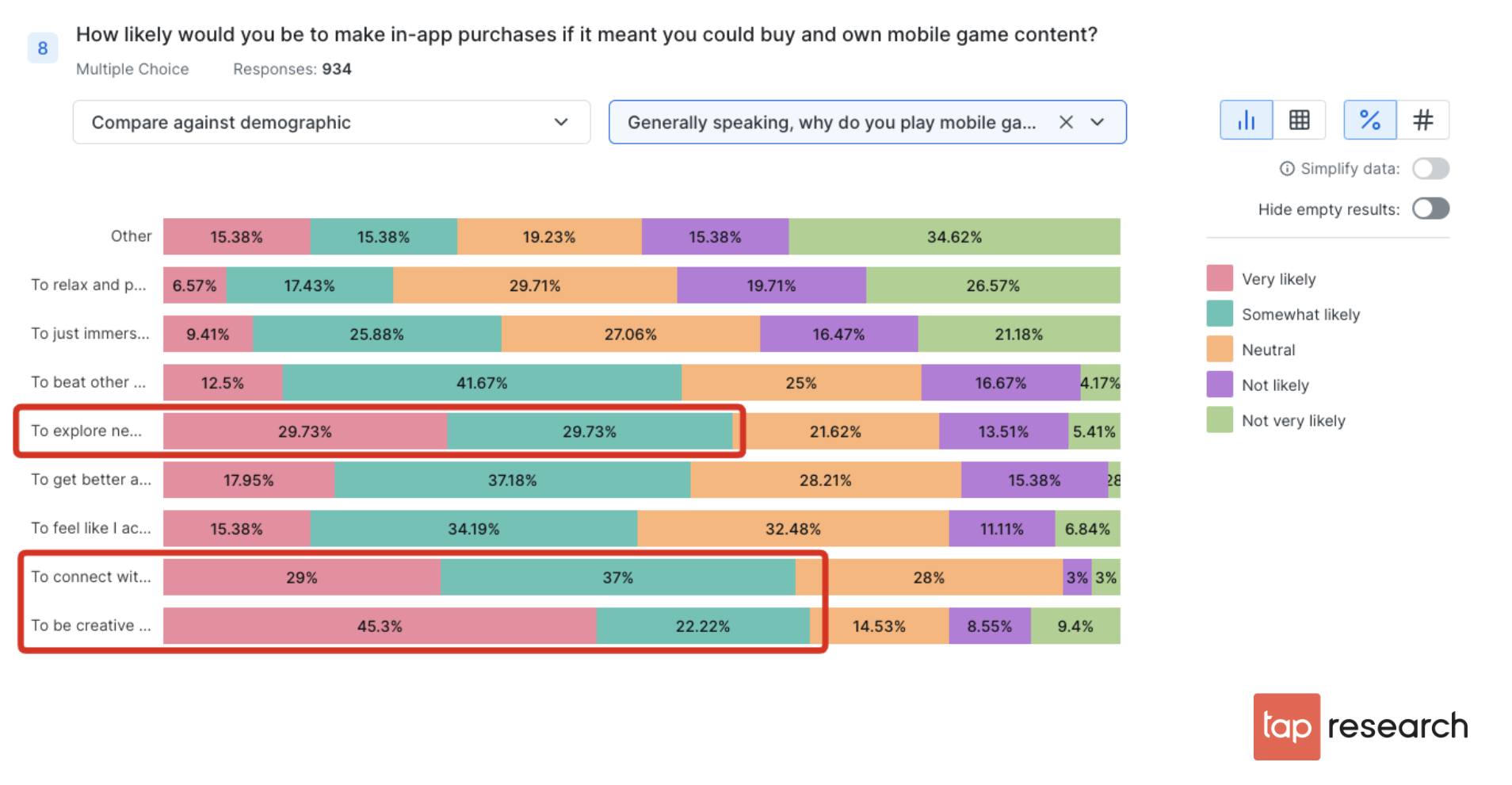[PLAYER INSIGHTS] Do Mobile Gamers Understand Digital Asset Ownership?
In a post we wrote about the differences between Web2 and Web3 mobile gamers, we looked at what gaming genres seemed to correlate most with crypto wallet ownership. We also looked at what player motivations tended to correlate most with the potential of getting a crypto wallet.
In our most recent survey, we wanted to find out if the idea of “ownership” of mobile gaming content would influence gamers in any way, who exactly might it influence, and perhaps most important, whether gamers truly understood what "ownership" of digital content really meant. The results were quite interesting.
Methodology
We surveyed 1,001 mobile gamers, balanced to the US Census. In a couple hours, we had our results.
Can Content “Ownership” Increase iAPs
It’s not a stretch to say that content ownership in a mobile game would positively influence iAPs. But where it gets interesting is looking at whether those gamers who rarely make iAPs would be influenced to make iAPs because of the ability to own the content.
Incredibly, 28% of those players who said they Very Rarely or Never make iAPs said they would be very likely or somewhat likely to make iAPs if it meant they could actually own the content they purchased.
There are simply too many variables to consider before thinking that if you create a Web3 mobile game you can instantly increase iAPs by 28%. But if nothing else, this should provide some insight into the potential influence that the concept of content “ownership” can have on your players.
That leads us to another question (as so often is the case). What players might content “ownership” influence most. Let’s take a look.
Who Does Content “Ownership” Influence Most
From the graph below you can see that gamers who play to Create (68%), Connect (66%), and Explore (59%) seem to be the most likely to make iAPs if it meant they owned the content.

To view the full survey results, click here.
Implications for Gaming Teams
In our last post about how the future of Web3 gaming we talked about how Web3 gaming looks bright and if you’re not exploring the possibilities there, then you’re likely missing a golden opportunity - especially if one of your genres is RPG!
In this post, we highlighted how the idea of content “ownership” can potentially influence players to buy your content. That said, let’s take a look at what some of the players said their idea of what content “ownership” meant to them…
“That it's not really mine, almost like renting it without physically having the product in hand.” - 49 y/o male
“Not sure. Maybe you own the rights of your game” - 51 y/o female
“Right to possess, buy, sell,trade, and utilize on their platform” - 50 y/o male
“You pay for unique pieces that can be used in multiple games” - 58 y/o female
“I can use it how I like or give it away / sell to other players” - 36 y/o male
“It means you have a right to use modify or sell said content” - 29 y/o female
“Sounds sketchy. Like nfts. You don't really own anything.” - 58 y/o female
“You have full and complete ownership legal or otherwise.” - 25 y/o male
As you can see in the varied responses from a range of demographics above, it’ll be critically important for publishers to fully explain and clearly educate their users as to what “ownership” actually is and what they can and can’t do with digital assets once they’ve bought the content in their Web3 games.
Obviously, you’re always looking for ways to activate new spenders and optimize monetization streams. This recent survey gives us some indication into the potential implications content “ownership” can have on your bottom line.
- Investing vs Expense - much like when people own their own home, they’ll invest in their property to improve their experience living in it and to increase its value. Likewise, if players feel like they own content in a game then they’re more likely to see that ownership as an investment rather than an expense - and that can greatly influence their decision on whether to make more iAPs or not.
- Segmentation Is Key - if your players are visiting your game to Explore, Connect, or Create you may be in prime position to successfully launch a Web3 game. Of course, your type of game may be a dead giveaway as to why your players visit, but often, players’ motivations can be surprising and the only way to truly know what they want is by adding context to your user segments - and you do that by asking them.
Conclusion
If your product roadmap doesn’t include Web3 gaming in the near future, you should strongly reconsider. Of course, your best course of action is to ask your players directly with in-app rewarded surveys so you can minimize the risk and shorten the learning curve. And TapResearch can certainly help you do that!
If you’re interested in learning more about what motivates your players to inform your decision making, we have some exciting solutions to share with you. 
If you would like to learn more about how TapResearch can help your marketing & user acquisition team acquire more users, and help your product team optimize gameplay to better engage and retain those users then  or
or  to get started right away.
to get started right away.
